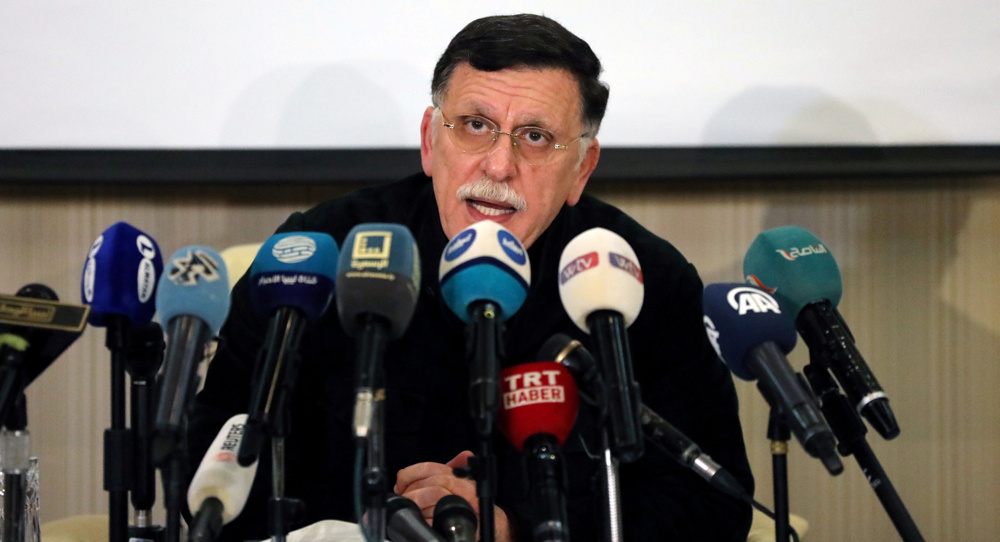Libya’s Prime Minister Sarraj to resign soon: Report
Libyan Prime Minister Fayez al-Sarraj will announce his resignation soon, a report says, amid ongoing negotiations with a rival power camp about the political future of the country.
Citing unnamed officials, Bloomberg reported on Tuesday that Sarraj was expected to announce the decision by the end of the week.
Sarraj, however, will stay in a caretaker capacity through negotiations for a new government in Geneva next month, according to the report.
Sarraj’s internationally-recognized government controls parts of western Libya. It regained full control of the capital, Tripoli, in June, after repelling a yearlong offensive by rebels under the command of military strongman Khalifa Haftar. The rebels support the rival administration based in the east of the country, which resigned a few days ago amid popular protests.
Libya initially plunged into chaos in 2011, when a popular uprising and a NATO intervention led to the ouster of long-time dictator Muammar Gaddafi. Sarraj’s government and the rival administration were formed in 2014.
During the Geneva talks, the rival sides will be asked to agree on a new presidential council structure that unifies the country’s dueling administrations and schedule elections, according to Bloomberg.
In talks held in Switzerland earlier this month, the rivals agreed to hold elections within 18 months and restructure the government.
The talks have also boosted the prospect of negotiations to restart oil production in the country.
Libya, which sits atop the largest oil reserves in Africa, has been forced to stop oil production since the rebels took control of the export terminals and fields in the east in January and launched a push to squeeze the resources of the Tripoli government. The blockade has cost Libya 6.5 billion dollars in lost revenue.
Haftar-allied government resigns
On Sunday, people protesting regular power cuts, cash shortages, and high fuel prices set fire to the headquarters of the eastern administration in Benghazi, forcing it to resign.
Prime Minister Abdallah al-Thani handed the government’s resignation to Speaker Aguila Saleh late on Sunday, according to a spokesman for the Tobruk-based House of Representatives (HoR).
Lawmakers said they would review the resignation in their next meeting. No date was set for the session, however.
The county had already become the scene of protests over power cuts and deteriorating living conditions since last Thursday.
On Saturday, one protester was killed and three others were wounded in al-Marj, another rebel stronghold.
The casualties were the result of “the reported excessive use of force by eastern authorities against peaceful demonstrators,” according to the United Nations Support Mission in Libya (UNSMIL), which called for “a thorough and immediate” investigation of the incident.
Turkey, Russia to hold talks on Libya
Officials from Turkey, which supports Sarraj’s government, will hold negotiations with Russian officials in Ankara this week on developments in Libya and Syria, where the two countries back opposing sides.
“Consultations between Turkish and Russian interagency delegations on Libya and Syria will continue at a technical level on September 15-16, 2020 in Ankara,” the Turkish Foreign Ministry said on Monday.
The two sides have been holding talks on a lasting ceasefire and a political settlement in Libya.
UN adopts change in structure of Libya mission under US pressure
Under pressure from the United States, the UN Security Council adopted a resolution on Tuesday to endorse a change in the structure of UNSMIL, which will now have a special envoy and a coordinator.
Thirteen of the 15 Council members voted for the resolution, with Russia and China abstaining.
Under the resolution, “UNSMIL should be led by a special envoy of the secretary general… with a particular focus on good offices and mediation with Libyan and international actors to end the conflict.”
UN Secretary General Antonio Guterres should now appoint individuals to the new positions.
UNSMIL has not had a special envoy since Ghassan Salame stepped down for health reasons in March.
Guterres had appointed former Algerian foreign minister Ramtane Lamamra to replace Salame, but Washington rejected his nomination for reasons that were not made public. Guterres then turned to former Ghanaian minister Hanna Serwaa Tetteh, but the US again rejected him, asking that the post be split in two.
The other 14 Council members have accused the US of stalling the nomination process.
Washington has pushed for former Danish prime minister Helle Thorning-Schmidt to be the next special envoy.
VIDEO | Yemenis praise the military for its successful operations against Israel
VIDEO | Iran’s Leader receives eulogists on Hazrat Fatima birth anniv.
VIDEO | Israel continues to bomb Gaza homes
VIDEO | An insider's view of the country: Meybod City in Yazd
‘All wars have rules. All of those rules have been broken’ by Israel
VIDEO | Report flags India’s violation of rights of Rohingya detainees
Turkey's foreign minister meets Syria's de facto leader in Damascus
VIDEO | US Syria plots















 This makes it easy to access the Press TV website
This makes it easy to access the Press TV website